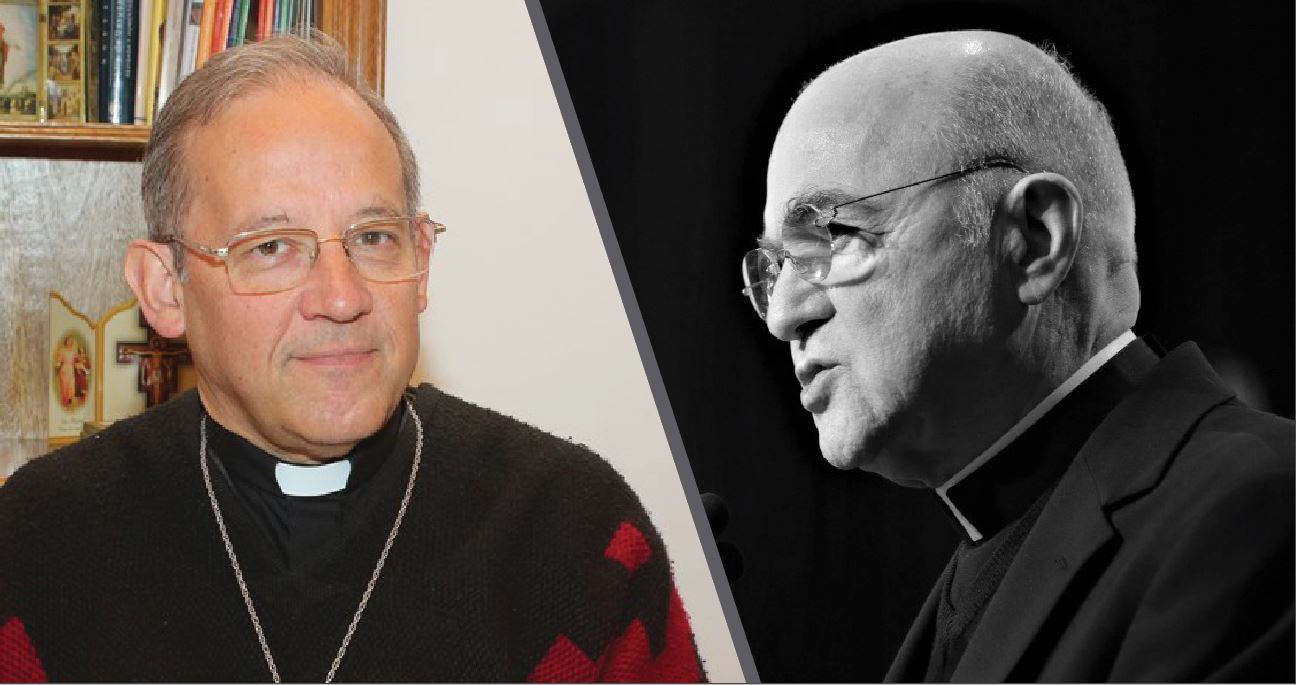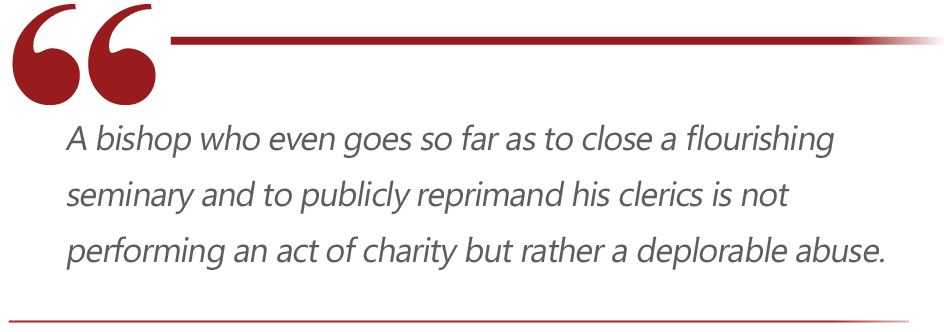Saint Ignatius of Loyola founded ‘The Company of Jesus’, with the purpose of fighting against heresy and vice, apathy and decadence, under the banner of Christ.
The heresiarch Jorge Mario Bergoglio on the contrary, starting in Argentina, has promoted heresy, apathy, vice and moral and spiritual decline.
St. Ignatius of Loyola:
“Whoever calls the heretics Evangelicals should pay some kind of fee, so that the Devil may not rejoice at having the enemies of the Gospel and the Cross of Christ being given a name contrary to their works.
Heretics should be called by that name in order to raise horror of those who are such and cover their deadly venom with the veil of a name of salvation.”
(Obras completas de San Ignacio de Loyola,
Biblioteca de Autores Cristianos, Madrid, 1952, carta 111, p. 880


Saint Ignatius of Loyola judges Bergoglio's heresies
“Truth always shines with the brightness which belongs to it, while falsehood is wrapped in darkness; to dispel this darkness it is enough to put falsehood in the presence of truth.”
“Priests who incline to Protestantism should be deprived-better that the flock have no pastor than have a wolf for a shepherd”
“Truth always shines with the brightness which belongs to it, while falsehood is wrapped in darkness; to dispel this darkness it is enough to put falsehood in the presence of truth.”
“Priests who incline to Protestantism should be deprived-better that the flock have no pastor than have a wolf for a shepherd”
…judges Francis’ idea on reforming the Church
Saint Ignatius preaches to counter laxness in customs and indifference
My good brother, everywhere, I perceive a great laxation of customs and much indifference in the fulfillments of Christian duty. I find the cause of this disorder in the ignorance of the people and I am firmly resolved to preach wherever I may be, as long as it is possible for me, for the greater glory of God, our Master and Lord. (J. M. S. Daurignac. Vie de Saint Ignace de Loyala. Paris, 1861, p. 155–157)
His preaching led a great number of penitents to the confessionals
He preached every Sunday, every feast day and three weekdays, besides the catechism he taught the children. The first time he preached, there was an immense multitude to hear him. [..] Ignatius, far from exciting the rejection of the people, inspired profound veneration for the sanctity of his life, and attracted all hearts to himself due his simplicity of manners, the sweetness of his words, the benevolence of his gaze and the amiable goodness of which he rendered witness to all. […] They came from all the villages, castles and cities of the province to consult the saint, to hear him, see him and ask for prayers. Since there was no church that could contain the multitude that congregated about him, he had to speak outdoors, and despite the faintness of his voice, it was heard at a great distance. Some even climbed trees in order to listen to him. The clergy of the province had never seen such a great number of penitents invade the confessionals; for all, eager to reform their lives and to put into practice the holy words that they had heard, wished to begin by purifying their consciences. (J. M. S. Daurignac. Vie de Saint Ignace de Loyola. Paris, 1861, p. 155–157)
…judges Francis’ idea on Ascetism and silence in the Spiritual Exercises…
Motives for the practice of external penance during the Spiritual Exercises
The first Note is that the exterior penances are done chiefly for three ends: First, as satisfaction for the sins committed; Second, to conquer oneself – that is, to make sensuality obey reason and all inferior parts be more subject to the superior; Third, to seek and find some grace or gift which the person wants and desires; as, for instance, if he desires to have interior contrition for his sins, or to weep much over them, or over the pains and sufferings which Christ our Lord suffered in His Passion, or to settle some doubt in which the person finds himself.[…] Third Note. The third: When the person who is exercising himself does not yet find what he desires – as tears, consolations, etc., – it often helps for him to make a change in food, in sleep and in other ways of doing penance, so that he change himself, doing penance two or three days, and two or three others not. For it suits some to do more penance and others less, and we often omit doing penance from sensual love and from an erroneous judgment. (Saint Ignatius of Loyola, Spiritual Exercises, Tenth Addition – Rule of Penance)
Asceticism in the important ‘Additions to make the exercises better’ by Saint Ignatius
Sixth addition: I will lay aside during the first week all joyful thoughts, such as the glorious Resurrection of Jesus Christ. This thought would dry up the tears which I ought at this period to shed over my sins. I must rather call up thoughts of death and judgment, in order to assist my sorrow.
Seventh addition: For the same purpose, I will shut out the daylight. Only allowing sufficient light to enter my room to enable me to read and take my meals.
Eighth addition: I will carefully avoid all laughter, or anything which can lead to it.
Ninth addition: I will not look at anyone, unless obliged to salute them or say adieu. (Saint Ignatius of Loyola, Spiritual Exercises, Additions 6-9)
The Sentire cum Ecclesia not only requires the performance of penance, but also that it be praised
[To have the true sentiment which we ought to have in the Church Militant] Seventh Rule. To praise Constitutions about fasts and abstinence, as of Lent, Ember Days, Vigils, Friday and Saturday; likewise penances, not only interior, but also exterior. (Saint Ignatius of Loyola, Spiritual Exercises, Rules for the Sentire cum Ecclesia)

















 30 July 2020
30 July 2020


















